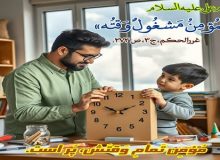
The Importance and Effects of Maintaining Kinship Ties (Silat al-Rahm) in the Quran and Its Impact on Marital Life
Maintaining kinship ties (Silat al-Rahm) is a key concept emphasized in the Holy Quran and Islamic traditions, referring to preserving and strengthening relationships with relatives and close ones. This principle not only influences family relations but also has profound effects on social, spiritual, and even marital life. The Holy Quran and the narrations of the Prophet and his infallible family(peace be upon them) have particularly highlighted the importance of maintaining kinship ties and strongly prohibited severing them. This article examines the significance of Silat al-Rahm in the Quran and its impact on marital life.
The Importance of Silat al-Rahm in the Holy Quran
The Holy Quran mentions the importance of Silat al-Rahm in numerous verses. In Surah An-Nisa (4:1), Allah says:
“O people, fear your Lord, who created you from a single soul. From it He created its spouse, and from both of them scattered many men and women. Fear Allah, by whom you ask one another, and (fear) the wombs (lest you sever its relationship). Allah is ever watching over you. “ (An-Nisa 4:1, translation by Qarib, cited from http://www.parsquran.com/)
This verse indicates that humans were created from a single soul and must avoid severing ties with relatives, for Allah is ever watchful over their actions. Allamah Tabatabai, in Tafsir al-Mizan, emphasizes the sanctity of maintaining kinship ties, stating that one must honor relatives, fulfill their rights, and avoid neglecting them. The term “arham” (wombs/kinship) refers to blood relatives, and upholding ties with them is a crucial duty for every Muslim.
In Surah Al-Baqarah (2:27), Allah states:
“who break the covenant of Allah after accepting it and sever what Allah has bidden to be joined and corrupt in the land. These are the losers.“ (Al-Baqarah 2:27, translation by Qarib, cited from http://www.parsquran.com/)
This verse describes those who sever divine bonds—including kinship ties—as corrupt and doomed to loss.
The Positive Effects of Silat al-Rahm
Silat al-Rahm is not limited to mere visits but includes kindness, compassion, and support for relatives. In Surah Al-Baqarah (2:83), Allah commands:
“(Remember) when We made a covenant with the Children of Israel, you shall worship none except Allah. Show kindness to your parents, to kinsmen, to the orphans, and to the needy, and speak of goodness to people. Establish your prayers and pay the obligatory charity. But, except for a few, you all turned your backs and gave no heed.“ (Al-Baqarah 2:83,translation by Qarib, cited from http://www.parsquran.com/)
This verse shows that kindness to relatives and the needy is a divine command, strengthening social and familial bonds.
Imam al-Baqir (peace be upon him) said:
“Maintaining kinship ties purifies deeds, increases wealth, wards off calamities, eases the reckoning (on Judgment Day), and delays death.“ (Al-Kafi, Vol. 2, p. 150, cited from Hawzah Encyclopedia)
This hadith highlights the profound individual and social benefits of Silat al-Rahm.
One of the important secrets to increasing life expectancy
And in another Hadith Imam al-Rida (peace be upon him) said:
A man may have three years left of his life, but he maintains the ties of kinship, and God will increase his life span to thirty years because of this deed. (Al-Kafi, Vol. 2, p. 150, cited from Hawzah Encyclopedia).
The Impact of Silat al-Rahm on Marital Life
Silat al-Rahm plays a significant role in marital life. After marriage, spouses interact not only with their own families but also with their in-laws. Proper interaction with both families fosters greater harmony and understanding between spouses. Silat al-Rahm in this context is not merely about formal visits but includes respect, kindness, and helping relatives in need.
However, a lack of awareness about proper Silat al-Rahm can sometimes create marital conflicts. For example, if one spouse focuses excessively on material comparisons (such as envying relatives’ possessions) during visits, it may lead to arguments and tension rather than strengthening bonds.
Adhering to the Principles of Silat al-Rahm
For Silat al-Rahm to positively impact marital life, spouses should avoid negative behaviors such as:
- Envying others’ possessions
- Engaging in unnecessary formalities
- Neglecting their spouse’s feelings
Silat al-Rahm must be performed sincerely, free from hypocrisy and pretension, to strengthen familial and marital bonds.
Warning Against Severing Kinship Ties
Severing kinship ties is not only a major sin but also carries severe consequences. In Surah Ar-Ra’d (13:25), Allah warns:
“As for those who break the covenant of Allah after accepting it, who part what He has commanded to be united and worked corruption in the land, a curse shall be laid on them, and they shall have an evil abode.“ (Ar-Ra’d 13:25, translation by Qarib, cited from http://www.parsquran.com/)
This verse warns that those who cut divine bonds—including kinship—will face Allah’s curse and a wretched fate in the Hereafter.
Conclusion
Silat al-Rahm is a vital Islamic commandment that strengthens family ties, increases blessings, and prevents corruption. In marital life, it fosters peace and mutual understanding—provided it is practiced sincerely and correctly. The Quran and the teachings of the Prophet and his infallible family, peace be upon them.
emphasize this principle while warning that severing kinship ties has grave consequences. Muslims must uphold these bonds with kindness and sincerity.
References:
- The Holy Quran, Surah An-Nisa 4:1, translation by Qarib, cited from http://www.parsquran.com/.
- The Holy Quran, Surah Al-Baqarah 2:27, translation by Qarib, cited from http://www.parsquran.com/.
- The Holy Quran, Surah Al-Baqarah 2:83, translation by Qarib, cited from http://www.parsquran.com/.
- The Holy Quran, Surah Ar-Ra’d 13:25, translation by Qarib, cited from http://www.parsquran.com/.
- Allamah Tabatabai, Tafsir al-Mizan, summarized edition, cited from the Foundation of Islamic Sciences and Ma’arif; http://tadabbor.org.
- Al-Kafi, Vol. 2, p. 150, cited from Hawzah Encyclopedia, https://fa.wikifeqh.ir.
Prepared By: Vahid Nazhd Saei





ثبت دیدگاه